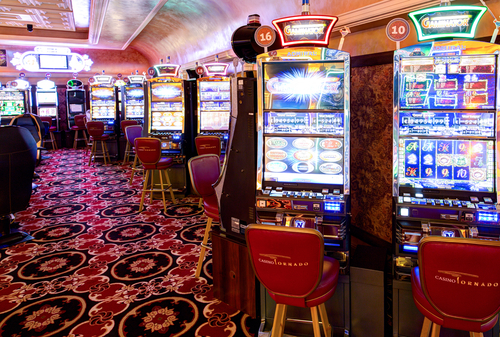
Casino entertainment have long been a staple in human culture, delivering not just entertainment but a intriguing reflection of our dreams, wishes, and anxieties. From the spinning reels of a slot machine to the strategic gameplay of poker, these games encapsulate a spectrum of human sentiments and incidents. At their core, casino games are not just a chance to win money; they are a reflection of life itself, where risk versus reward converge and fortunes can change in an eye blink.
As players gather around tables or sit in front of brightly lit machines, they engage in a ritual that transcends mere betting. These games echo our natural desires for relationships, adventure, and the quest for chance. They also unveil deeper truths about human psychology, such as our relationship with luck and the excitement of risk. In exploring casino games, we reveal not only the mechanics of play but also the rich tapestry of the human story, showcasing our woven narratives of goal and reality.
The Psychology of Gambling
Wagering is deeply rooted in human psychology, appealing to various feelings and desires. The excitement of taking risks is a core aspect that attracts participants, whether it’s thrill of spinning a roulette or the excitement of drawing a winning card in a poker game. This adrenaline is often compared to other forms of thrill, as the unpredictability of outcomes elicits a unique psychological response. bakar69 Gamblers often become entranced by the chance of striking it rich, leading to an almost magnetic draw toward casino games.
Another, an essential component of the psychology behind gambling is the concept of hope and aspiration. Players often nourish dreams of financial freedom and the opulent lifestyle that can accompany winning. This optimism fuels their ongoing participation in casino games, as it provides a sense of purpose and the conviction that a transformative win could be just one bet away. The story of beating the odds and achieving success resonates with many, strengthening their commitment to play and engage with these games.
Finally, social aspects play a significant role in gambling psychology. Casino environments are designed to foster social interaction, where gamblers gather to share the journey of wins and losses. This shared aspect not only enhances enjoyment but also influences behavior, as individuals often mimic the actions of others in their vicinity. The collective approval found in mutual thrill can magnify the emotional experience, making casino games a reflection of not just personal desires but also collective engagement within the gaming community.
### Risk and Reward: A Double-Edged Sword
Casino games embody the subtle balance between danger and reward that resonates profoundly with human nature. The thrill of placing a wager is often accompanied by a surge of excitement, as players are confronted with the chance of striking it rich, yet cognizant of the risk to suffer losses. This bipartisan experience reflects a core aspect of life: the choices we make often come with intrinsic risks, and the chase for gain can compel us to make risky moves we might not normally consider. In this way, casino games reflect real-world decisions, enticing gamblers to risk not just their capital, but also their hopes.
The allure of jackpot prizes and payouts fuels a feeling of positivity, encouraging players to envision a better future that could emerge from a single victorious spin of the wheel or dealing of a hand. This positive outlook can compel individuals to engage in riskier behaviors, urging them to take greater risks in search of financial gain. However, just as in life, the consequences of these decisions can lead to both victory and despair. The narratives of both big winners and those who have lost everything at the casino demonstrate the unpredictable nature of luck and its consequential effect on our existence.
Ultimately, the interaction of engaging with gambling activities serves as a potent reminder of the nature of humanity. Every round played is filled with the tension of risk, as gamblers weigh the gains against the risks. This interaction not only highlights the thrill that comes with betting but also unveils the weaknesses that come with the desire for more. As we navigate the challenges of decision-making and results in both the gambling world and in life, we find that the quest for gain shapes our sense of self and experiences in deep ways.
Society and Loneliness in Gambling Environment
Casino environment is a unique mix of social interaction and personal endeavor, reflecting the tensions of human experience. Gamblers often gather around games, sharing in the thrill of the action, rejoicing in wins, and commiserating over losses. This communal aspect is essential, as it establishes a sense of community and bonding among diverse groups of individuals. Regular visitors to casinos may build friendships and establish routines, turning the casino into a second home where they feel linked to a larger community of gamblers.
However, the attraction of casino activities can also result to loneliness. As players become engrossed in the excitement of playing, they may isolate from personal connections or fail to interact with the environment outside the gaming space. For some, the search of a windfall can distract from real relationships, leading to loneliness. The situation of being among others yet feeling solitary is not rare, as the attention shifts from shared enjoyment to the private concerns of each individual’s path.
This interplay of community and isolation creates a rich mosaic that defines gaming culture. It showcases the intricacy of human interactions, where happiness and sorrow exist together. Casinos serve as both a sanctuary for social interaction and a platform for individual challenges, illustrating how deeply connected our yearning for companionship and the individual quest for fortune can be. In navigating this landscape, gamblers confront their own stories—seeking both the thrill of the wager and the fellowship of other players, ultimately reflecting the broader spectrum of individual experience.